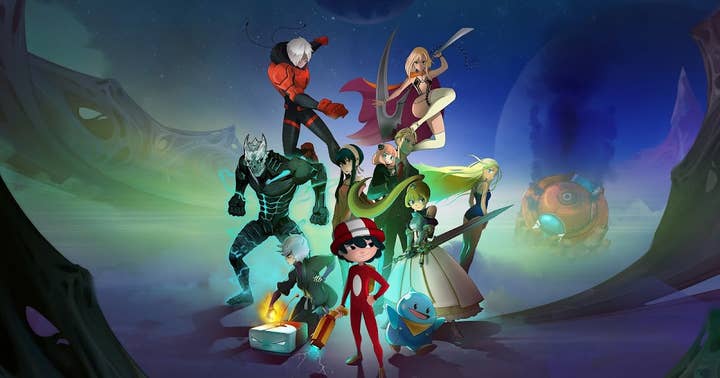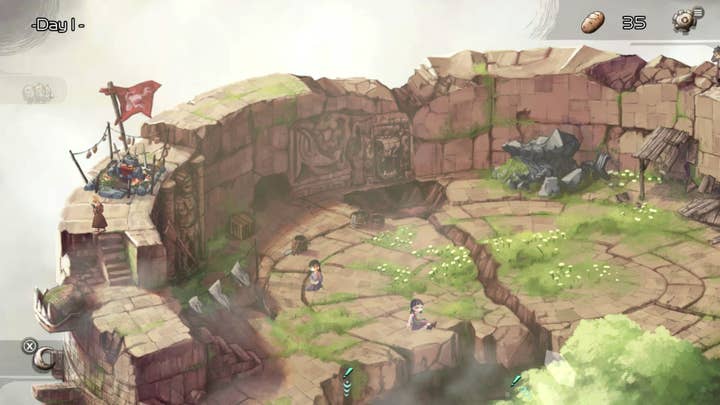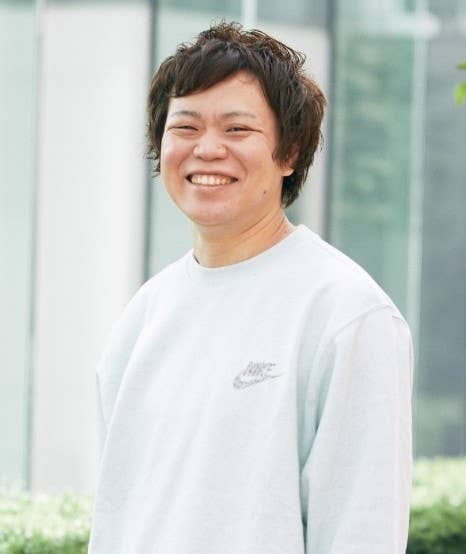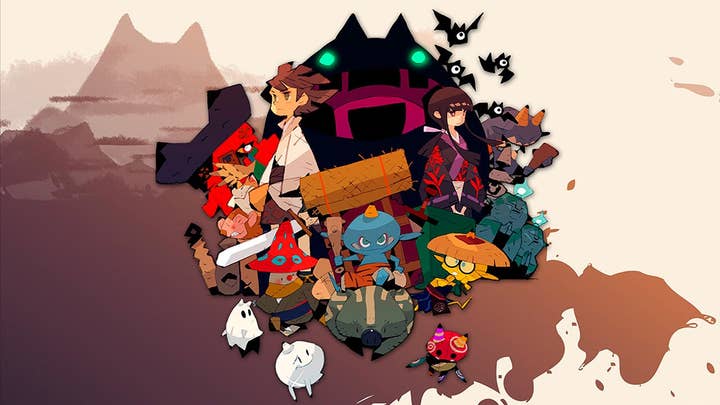Shueisha Games' quest to become the "Japanese Devolver"
Indie publisher’s Michiharu Mori and John Davis on working on IP old and new, and avoiding being pigeonholed
Sign up for the GI Daily here to get the biggest news straight to your inbox
One year ago, Japanese manga publishing giant Shueisha announced the opening of its dedicated games branch.
The idea was borne from Shueisha's Game Creators Camp, which western PR manager John Davis (who's also the co-founder of Kyoto-based indie games festival BitSummit) describes as "an incubator for indie developers in Japan."
Since then, it's successfully released a handful of games, including Kenei Design's Oni: Road to be the Mightiest Oni last month and Tasto Alpha's Arcana of Paradise - The Tower last week. And most of Shueisha's titles came out of its Creators Camp.
"The natural progression was for us to go from supporting indies to actually publishing and funding indies," Davis tells GamesIndustry.biz.
"The main goal of Creators Camp is not just for us to be able to cherry-pick the best stuff," executive officer, director of marketing and corporate Michiharu Mori continues. "We want to create a community. We have developers, artists, engineers, influencers, game hobbyist media, come into one area and create this community that not only Shueisha can go to and talk to people about projects, but other publishers and developers around Asia can find resources for.
"We are basically trying to build up this new indie publishing brand worldwide to spread the name of Shueisha"John Davis

"So, of course we're going to be on the lookout for anything great coming out of the Creators Camp, but it's more of Shueisha investing back in creating creators. We want to build these people up and give them opportunities, and of course, if we can work together, that's great. If they want to go and work with someone else, that's fine as well. It's just more about building a community."
Shueisha Games' first published project was Momo-pi's Captain Velvet Meteor: The Jump+ Dimensions last year (keep an eye out for an interview with the developer later this week), which features eight IP from Shueisha's wider portfolio.
Leveraging the mother company's IP is at the heart of its freshly established gaming branch, but the team is keen to go beyond these boundaries, too.
"We are basically trying to build up this new indie publishing brand worldwide to spread the name of Shueisha," Davis says. "Hopefully we can use some IPs to make some interesting things, but it's not exclusively going to be that."
The anime and manga adaptations ecosystem is buoyant, with big names like Spike Chunsoft, Bandai Namco or Square Enix already well established in video games. Shueisha's key difference will be to champion indie teams, Mori explains.
"What's going to differentiate us from some of the bigger publishers like Bandai Namco is that we're focused on smaller teams, smaller games, and with less restrictions," he says. "One of the things about using those big IPs is that it's really difficult to do a lot of things. You have to get a lot of approval. If you haven't worked in Japan, you don't understand how approval is very, very… There's a lot of red tape."
Davis confirms: "For me personally, coming from working with a lot of indie stuff and being freelance for a long time, when I came in and started doing things, I was just like, 'Oh, assets. I'll just take this, and send it out on Twitter.' And then Mori was like, 'Whoa, whoa, whoa, [you can't do that]'," he laughs. "But we want to be like a Devolver in Japan."
It's a comparison that the company had already mentioned in the past, and an interesting one. Devolver Digital carries a lot of weight, and the publishing label has a very distinct personality.
"I think it's really important for publishers to have that personality, and to have a strong brand identity, because it brings in people again," Davis says. "Of course, we want to support Japanese indies, but also indies around the world.
"We want to have a nice catalogue of games that showcases different artists and just not necessarily tied to the IPs that Shueisha owns. Of course, if we can find somebody that's going to do something really interesting with the IP, like Captain Velvet, then we'll go for that. But you won't see us making an indie Dragon Ball game."
Mori adds: "This is based on the company – Shueisha is always investing in manga artists. So, developing new IPs from manga, this is the same model; we're investing in game artists. We make new IPs from games. This is the same company culture."

The common thread between all Shueisha games for now is that they have a "Japanese sensibility," Davis says. While the team is happy to have that identity for now, it doesn't exclude venturing outside of these borders, depending on the kind of titles it signs, he adds.
The publisher also wishes to remain multiplatform, with the caveat that Xbox has historically had a very low market share in Japan.
"We're platform agnostic," Davis says. "All of our games will be released on Steam. Switch as well, because that's such a big platform, and PlayStation. If we're only publishing in Japan… Xbox is a little bit scary."
Mori also points to their mobile projects, such as Unveil, which it's developing in partnership with NetEase. And as far as budget goes, Davis says that will depend on the mothership.
"Shueisha has a lot of money," Mori laughs.
"Because we have a big budget, we can think with a long-term vision"Michiharu Mori
Davis continues: "I would say that from all of the publishers and developers that I've worked with, this company has the most investment capital for projects than any others. So it's quite refreshing."
The sheer size of Shueisha – and its reputation – might be underestimated outside of Japan and/or by anyone unfamiliar with the manga and anime industries. The company, established in 1925, is the largest publishing company in Japan.
And its games branch is now building up its team to leverage that prominent position. Currently employing 20 staff, Shueisha Games' team started at just four people last year. And "maybe next year we'll have 30 or 40," Mori adds.
"Everybody has a lot of experience," Davis continues. "The biggest challenge for publishers these days is marketing, promotion, creating assets, things like that. I would say that Shueisha has a very promotional and marketing-driven mindset because of all their experience with manga and anime. And so we have a lot of opportunities to do cross-promotional things. But you've got to staff up to have those ideas come to fruition. We've got a lot of ideas now, and we're just trying to build up enough people to support it."
Mori adds that Shueisha's strong point is its long-term vision.
"So many indie publishers don't [have one]," he says. "Because we have a big budget, we can think with a long-term vision."

As hinted at by Davis, there's a lot of potential for crossover between mediums as part of Shueisha. In fact, the publisher has already released two board games in addition to its digital projects, based on Shueisha IP, and released a one-shot manga alongside the launch of Captain Velvet Meteor, introducing readers to the story of the game.
"You have to leverage your strengths," Davis says.
Having multiple jumping points into its IPs is most definitely a strength, creating a virtuous circle for the publisher, Mori explains.
"Now, you have various points of entry. People might like the anime, so they go read the manga, or vice versa. We want to get games into that loop as well. We want to have not just these existing IPs, but also new IPs that we can develop, like Oni, and say, 'Okay, yes, I loved it, I read the manga, it's great, maybe we'll make an anime about this.' And we're just constantly feeding them into this Shueisha content ecosystem."
"Now, you have various points of entry. People might like the anime, so they go read the manga, or vice versa. We want to get games into that loop as well"Michiharu Mori

There is perhaps a misconception that manga or anime adaptations only target players who are already fans of the said manga and anime. We ask Mori and Davis how Shueisha intends to fight against that vision and attract more players.
"It's very easy to get pigeonholed into a certain category," Davis says. "I think people see Bandai Namco, and they're like, 'Okay, they're making One Piece games, or making Dragon Ball games, and that's not for me.' I hope that our catalogue has enough variety in it that we're going to be able to pull people in, and maybe introduce them to things that they haven't seen before. And then they'll say, 'Oh, you know what? Maybe I want to go read the manga.' We hope that it works both ways."
The indie development scene in Japan has evolved in interesting ways over the past decade, catching up with the international boom with a bit of a delay and reaching new highs in recent years.
"BitSummit celebrated [its] tenth year last year, and I've watched the curve of Japanese indies go from, 'I don't even want to say this word,' to a lot of people leaving their big studios, some star studios," Davis says. "So, the curve has been gradually going up. Investment in indies has grown and diversified in Japan, the level that Japan indies are at now is slowly catching up to the rest of the world.
"During the 'indiepocalypse' ten years ago, I remember all these games were coming out, and people were like, 'This is going to be terrible! Nobody's going to be able to sell anything, there are too many games,' etc. But the level was so high that you had a lot of breakout successes that raised the tide for everybody. And we feel like Japan is slowly catching up to that.
"I think Korea and China leapfrogged Japan in that sense. There's just not a very big entrepreneurial culture in Japan, where people say, 'Fuck it, I'm going to quit my job, and I'll start my own thing.' That's something that's happened recently, the change, I think in the past ten years, in the games industry in Japan, with a lot of big creators. Kojima left Konami, Yamaoka left Konami. Everybody stopped, and just said, 'Okay, we're going to work for [ourselves].' It's slowly catching up. I think in the next couple of years, you'll see bigger, better projects.
"But Japan also has this very doujinshi [culture]. Doujin is like handmade, self-created games, that I think will always be around. And they're not very commercially viable games. They're very like, 'I'm making it for myself and my friends,' type thing. That stuff, I don't think is going to change, but I think you'll see a lot more projects, a lot more AA indie, or triple-I projects. Which is really funny, because I grew up loving Japanese games, and idolising all the people that made them, but somewhere in the 2000s, Japanese development kind of got stagnant. I think it's starting to change. I can definitely see, in BitSummit, the quality of games going up."
"Kojima left Konami, Yamaoka left Konami. Everybody stopped, and just said, 'Okay, we're going to work for [ourselves].'"John Davis
Looking ahead, Shueisha Games very much hopes to be part of that movement of bigger, better Japanese indie projects. But for now, its objectives are simple.
"From a strictly business standpoint, we want to be a profitable company so that Shueisha will continue to fund us, and basically be able to get a larger share of global sales, and not just be limited to Japan," Mori says.
Davis adds: "Very drily, that's our goal right now. We want to stay alive to be able to do cool shit. And then, to do that, we need to have high-quality games, we need to have games that are going to win awards.
"We want to have really high-quality games, because you can't become, like I said, the Japanese Devolver without having critical recognition as well as commercial recognition. So, those are the two main focuses. It's pretty generic, but I think if we can achieve one of those goals, then it makes the other one a lot easier."
Sign up for the GI Daily here to get the biggest news straight to your inbox

